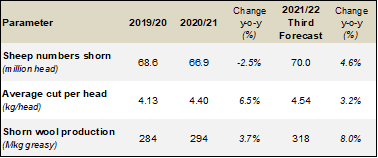Australian shorn wool production increases
The Australian Wool Production Forecasting Committee (AWPFC) has updated its forecast of shorn wool production for the 2021/22 season. This third forecast is for production of 318 million kilograms (Mkg) greasy, an 8.0% increase on the 2020/21 estimated shorn wool production of 294 Mkg greasy. It is an upward revision from the Committee’s August 2021 forecast of 310 Mkg.
- The latest Australian Wool Production Forecasting Committee’s forecast of shorn wool production for 2021/22 is 318 Mkg greasy, up 8.0% on 2020/21. Substantial rainfall during November built upon the favourable spring and set up a promising summer period for sheep and wool production. Shorn wool production is expected to increase by at least 6.6% in each state.
- Australian shorn wool production for 2020/21 is estimated to be 294 Mkg greasy, a 3.7% increase on the 284 Mkg total for 2019/20. This reflects the change to positive seasonal conditions across large parts of the country as the drought conditions in many regions eased.
The Australian Wool Production Forecasting Committee (AWPFC) has updated its forecast of shorn wool production for the 2021/22 season. This third forecast is for production of 318 million kilograms (Mkg) greasy, an 8.0% increase on the 2020/21 estimated shorn wool production of 294 Mkg greasy. It is an upward revision from the Committee’s August 2021 forecast of 310 Mkg.
Committee Chairman, Russell Pattinson said that "widespread November rain across most wool producing regions will build on the already exceptional spring season. Pasture feed is plentiful in many grazing regions, while in farming areas crop stubbles will also contribute to an ample supply of summer feed. The abundant feed supply is expected to increase average cut per head by 3.2% to 4.54 kg greasy”.
AWTA key test data from July to November show year-on-year increases in vegetable matter (up 0.6% to 2.3%) and yield (up 1% to 65.0%). Both are indicators of the improved seasonal conditions.
There is also evidence of a flock rebuild with an expected 4.6% increase in the number of sheep shorn to 70.0 million head this season. The favourable seasonal outlook is promoting high levels of optimism among sheep producers. The October 2021 AWI/MLA Wool and Sheepmeat Survey found that 91% of respondents intended to either maintain or increase breeding ewe numbers, through retaining more replacement and older ewes than normal.
The Committee confirmed its August estimate of shorn wool production for the 2020/21 season at 294 Mkg greasy, a 3.7% increase on the 284 Mkg greasy production for the 2019/20 season.
Table 1: Summary of Australian wool production

Note: Totals may not add due to rounding.
Table 2: Total shorn wool production by state (million kg)

Note: Totals may not add due to rounding.
The National Committee drew on advice from the six State Committees, each of which includes growers, brokers, private treaty merchants, sheep pregnancy scanners, representatives from State Departments of Agriculture and the Australian Wool Testing Authority. Data and input were also drawn from AWEX, wool exporters, the Australian Bureau of Statistics, ABARES, and Meat and Livestock Australia.
The state and national Committees will next meet in mid-April 2022.
The full forecast report will be available on the AWI website at www.wool.com/forecasts from 31st December 2021.
Released by:
Kevin Wilde
Australian Wool Innovation, Media Relations Manager
Mobile: +61 436 031 277













